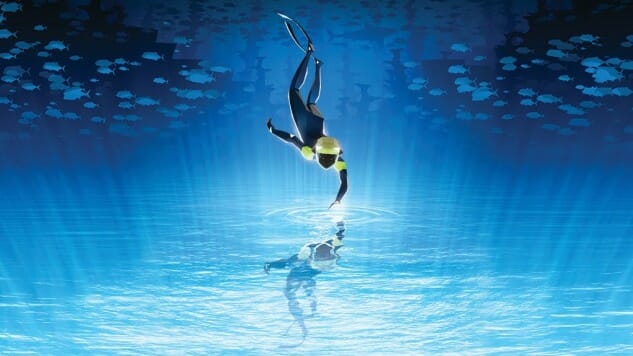Abzû is an Underwater Parade of Beautiful Things

The first thirty seconds of Abzû, an exploration game by the aptly named Giant Squid, are pacey and remarkable. Beginning above the water, the screen fills with blue sky and white clouds, and the camera suddenly tilts forward and dives beneath the surface. It’s a brilliant reveal—your view bursts with life and color, the stillness of the previous shot shattered entirely. It’s the moment every underwater film aims for—the reveal of the reef, the reveal of Rapture, and in this sense it’d be somewhat predictable were it not for what the camera does next. It doesn’t linger. It continues to dive, the colors becoming darker and the light fading. Deeper still and the life around you grows stranger, the blue sky a memory. In thirty seconds you travel from the surface to the very depths of the ocean and then, in a deliberately jarring cut, you find yourself back on the surface again.
Another game might have treated this like a preview; an opportunity to tease players with the journey they’re about to take, a whistle stop tour of vistas yet to come. Not Abzû. This is a game of such color and variety that it begins by showing you an entire ocean and then proceeds to show you an entirely different one.
It’s hard to know what to say. I don’t want to take away from the game’s moments of discovery, when great curtains of seaweed part to reveal something on the other side, when creatures glide onto the screen, when the music swells. Please bear with me. I’m trying to describe a game without describing it at all.
How about this? Abzû is a game about swimming beautifully. You control a black-and-yellow suited diver who, rather than having a mask obscuring their face, has a pair of large expressive eyes. Played in third person you’ll rarely catch a glimpse of their face but whenever you do they’re casting their eyes about at the ocean around them. And so you guide the diver through a series of wide, semi-open levels, each one focusing on a different aspect of the ocean. As you travel, a wider mystery begins to become apparent and the creatures around you become a little stranger, behave slightly differently. You perform slow somersaults in the water.
Did you ever see tide pools as a kid? Little bowls of salt water trapped in the rocks? I’d step carefully so as to avoid cutting my feet on sharp stones or stinging anemones and look down into the water. If you asked me, here’s what I’d say I was looking for: crabs, little fish, colorful seaweed, shrimps, sea cucumbers, anemones. All too often what I got was a tepid basin of cloudy water, perhaps a single crab claw, one or two shrimps picked clean. Tide pools never really delivered. Abzû is the tide pool that does.
The game is exactly as long as it needs to be, by which I mean that it’s about two hours. It exists for long enough to show you a parade of beautiful things, and then recognizes when it’s time to go. This is extremely valuable. It results in a game which so rarely loses control of its pacing, often literally sweeping you forward through the water, as well as a game that all but guarantees that just around the next corner there will be something new and surprising. We so often see games that sell themselves on their scale and their variety; an infinite universe of planets to explore, an entire archipelago filled with adventures. There is a place for these games, but there is just as much of a place for a game that focuses instead on depth rather than breadth. Everything in Abzû is hand-placed, every sequence considered, and while this inevitably results in a much shorter game, it leads to one filled with moments designed to amaze and surprise.
-

-

-

-

-

-

-

-

-

-

-

-

-

-

-

-

-

-

-

-

-

-

-

-

-

-

-

-

-

-

-

-

-

-

-

-

-

-

-

-









































